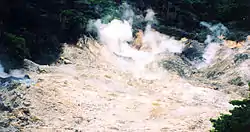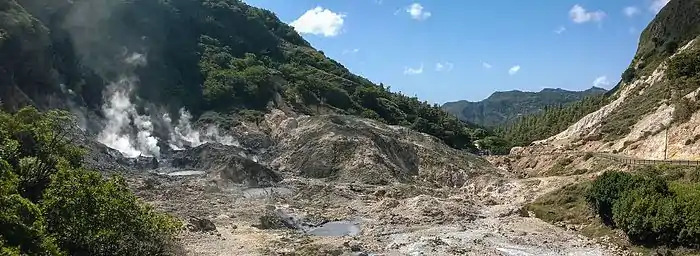Sulphur Springs, Saint Lucia
Sulphur Springs is the "world's only drive in volcano"; it is located in Saint Lucia towards the southwestern side of the island, near Soufrière (French for place from which sulfur is produced).
| Sulfur Springs | |
|---|---|
 Sulfur Springs | |
| Location | Soufrière, Saint Lucia |
| Coordinates | 13°50′17″N 61°02′46″W |
 Location in Saint Lucia | |

Mine
A sulphur mine was operated by Bennett and Wood from 1836 until 1840. Maximum production occurred in 1836, with 540 tons of sulphur exported.[1]
Springs
The creation of the sulfur springs, came from a weak spot in the crust of the enormous collapsed crater creating an upheaval of lava 410,000 years ago. The water located at the center of the springs boils at roughly 340 Fahrenheit (170 Celsius) creating large plumes of steam. The water coming out of the spring is blackened by a chemical reaction between the high content of sulfur and iron. The spring water also contains large deposits of copper, iron oxide, alkaline lead, calcium oxide, and carbon.
Tourist attraction
The Sulfur Springs are a popular tourist destination in St Lucia[2] due to their ability for tourists to literally drive up to the edge of the springs. Up until the mid-1990s, tourists were able to walk right up to the end of the tar-colored pits. Following an accident where a local tour guide named Gabriel fell through the crust into a pit and received second degree burns from just above his waist, the formation of what is now known as Gabriel's Hole has restricted viewing to a platform a few hundred feet away.[3]
A couple of hundred yards downstream from the springs, the water temperature is still hot (around 110 Fahrenheit or 45 Celsius), but cool enough for tourists to enter and give themselves a mud bath. These mud baths are believed by some to have medicinal properties[4] and are used by some tourists and locals for said reasons.
See also
References
- Devaux, Robert (1975). Saint Lucia Historic Sites. Saint Lucia National Trust. pp. 80–81.
- http://www.sulphurspringstlucia.com
- http://www.360travelguide.com/360VirtualTour.asp?iCode=stl27
- http://talkspas.com/2010/03/10/the-benefits-of-mud-baths/

